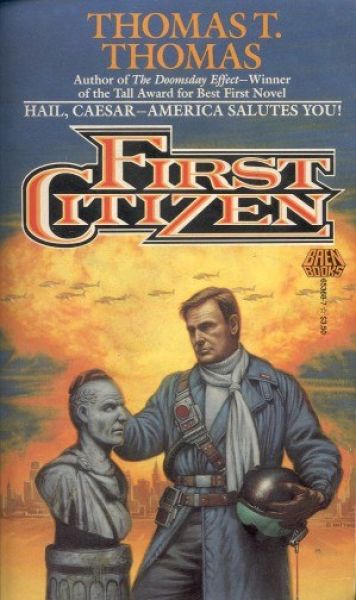Millennial Reviews XXXV: First Citizen by Thomas T. Thomas
First Citizen
By Thomas T. Thomas

9 Mar, 2000
0 comments
First Citizen
Thomas T. Thomas
Baen Books, 1987
373 pages
Synopsis: The rise of James Corbin to power during the fall of the American Republic, with strong parallels to the rise of Julius Caesar.
The collapse of the US federal government starts when the US repudiates its debt and also passes an amendment forbidding federal taxes. The US and world economy undergo a sudden extreme readjustment. Later, someone [who is never discovered] detonates a nuclear device in Washington DC and assassins keep killing the Presidents-elect, leaving the Speaker in the lead role politically.
Corbin tries his hand at several businesses, doing badly with solar power and well with garbage. He eventually decides to go into the mercenary business and takes a private army to Mexico, where the US has gotten itself sucked into a Mexican civil war. He acquits himself well, discovering a war crime at one point, leading to the trial and execution of the brother of his chief rival, Gordon Pollock.
Eventually, the five-times re-elected Speaker retires, coincidentally during a period of civil disorder in the USA. Pollack, Corbin and a relative non-entity are appointed as the Special Executive, the intention being that they will be easy for the next real Speaker to destroy when he is selected. They attempt to consolidate their power, using extremely violent methods, including a highly unfortunate use of tactical nuclear weapons at ranges which prove to be significantly less than the radius of their lethal effects. Since Pollack and Corbin hate each other, the alliance is unstable: eventually Pollack discovers a technically illegal action Corbin committed years earlier and has him impeached.
Corbin, expecting that he will be executed of he submits, brings his army from Mexico into the USA, violating US as he crosses the Rio Grande. Along the way, he wipes out three Mexican cities to get the pro-Pollack armies near them. A four-year civil war follows which Corbin eventually wins. After a brief affair with a Californian pot-grower, he returns to the capital of the section of the US he runs and rules until a conspiracy of senators kills him. The book ends with Michael Alcott, a general allied to Corbin, calling for vengeance on Corbin’s killers.
Strictly speaking, although the book starts well before the turn of the century, it runs well into our future and probably shouldn’t have been part of this series. Ah well.
Positive stuff: a lot of times, someone pulls a dramatic fix like the amendment in this book and everything just works out ok. In First Citizen, there is a huge economic disruption because of the debt repudiation. There’s also a ‘kill all the lawyers’ movement, which along with the repeating killing of politicians has a noticeably negative effect on society.
This could have been a much worse book. I didn’t find it very engaging for some reason, never really getting much of a feel for Corbin and I expect if I were more familiar with the career of one J. Caesar, I’d have gotten more out of the book.
The people of the US are in First Citizen pretty much cyphers, occasionally acting as impediments or serving as ground zero for weapons testing. In return, even during the ACWII, the Federal government has little impact on them, having emasculated itself with the amendments passing in ’92 and ratified in ’97: states are much more powerful. Corbin has great plans, of course but dies too young to see them carried out.
I thought the mapping of Roman history onto American was a bit forced, although points for a Roman-based SF novel which does not feature a faux-Belisarius.
This is not a great book by any means but competently enough done. Not our past and one hopes nothing to do with the future either.
